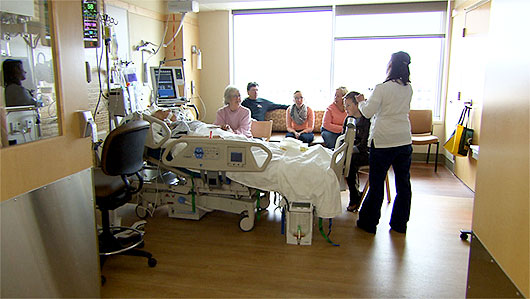Podcast: Play in new window | Download
Subscribe: Apple Podcasts | RSS
Hi, it’s Patrik Hutzel from INTENSIVECAREHOTLINE.COM where we instantly improve the lives for Families of critically ill Patients in Intensive Care, so that you can make informed decisions, have PEACE OF MIND, real power, real control and so that you can influence decision making fast, even if you’re not a doctor or a nurse in Intensive Care!
This is another episode of “YOUR QUESTIONS ANSWERED” and in last week’s episode I answered another question from our readers and the question was
You can check out last week’s question by clicking on the link here.
And in today’s episode of “YOUR QUESTIONS ANSWERED” I want to answer a question from one of my clients, Alicia and Alicia has her 72-year old husband in intensive care for three months now and Alicia wants to know if her husband can go home even on a ventilator with tracheostomy and on dialysis.
“My Husband is in ICU for 3 months on a Ventilator with Tracheostomy and on Dialysis. He Can’t Be Weaned Off the Ventilator. Can He Go Home? (Part 2)

Well, thank you, Alicia for clarifying your husband’s situation, it sounds like it’s been a very long and tough situation for you and for your husband to be in hospital and in ICU for such a long time.
Here is what I advise really Alicia. I mean, as you know already, your husband could go home with a service like intensive care at home, and that would be probably a good outcome for him and for you if he can’t come off the ventilator.
RECOMMENDED:
However, in the meantime, it’s probably too early not to push for him coming off the ventilator because, you know, it sounds like he’s done the 16 hours already in one day 20 hours. So it sounds like he’s definitely has some reserves, but now it looks like they’re not pushing hard enough and from that perspective, it’s probably a fine line between mobilization.
Mobilization is critical when patients are in intensive care and need to be weaned off the ventilator. It’s not happening without mobilization that’s number one.
Number two, you’ve got to continue the dialysis and make sure they can take as many fluids off as possible to offload any fluids from the lungs and as you’re aware, if he’s in pulmonary edema, he won’t come off the ventilator.
Now he’s had the heart attack, the MI last year, and he’s in chronic atrial fibrillation by the sounds of things, which also makes him more prone to potentially go into pulmonary edema.
Again, probably depending on how severe the heart attack was, depends on his ejection fraction. You know, you haven’t mentioned that they’ve done an ultrasound or a TOE to check his ejection fraction. You haven’t mentioned whether his AF is controlled.
Did he have a cardioversion? Is he on amiodarone? Is he on digoxin? Is he in fast AF? Is he in slow AF? Is he in AF that’s compromising his blood pressure. You haven’t mentioned any of that. I assume that given that your husband can tolerate dialysis, that he’s AF must be controlled somewhat because if he was to have a low blood pressure from the AF, probably couldn’t tolerate dialysis or at least couldn’t tolerate dialysis without inotropes or vasopressors.
RECOMMENDED:
Next, you mentioned the nutrition status and you mentioned that your husband seems very weak now after months in ICU, after months of intensive care treatment, after months of probably a disturbed day and night rhythm, after some weeks in an induced coma, many patients unfortunately are very weak when they come out of this situation.
Again, adequate nutrition is important. I mean, it sounds like he’s got the PEG. It sounds like they’ve done some swallowing tests already.
Adequate nutrition is very important. And also, as I mentioned, mobilization is very important because without mobilization you know, he can’t strengthen his muscles, he can’t strengthen his body. Also, imagine if he’s not sitting up, if he’s not getting mobilized, it’ll be very difficult for him to train his respiratory muscles and breathe by himself and breathe more and more by himself so that he can stay off the ventilator 24 hours a day.
Once he manages to stay off the ventilator 24 hours a day, then the next step is to get him off the ventilator and stay on the tracheostomy collar 24 hours a day. Then looking at frequency of suction, looking at, how much oxygen does he need?
Does he have a good, strong cough, can follow simple commands? And then if he has a good, strong cough, then hopefully the next step is to take the tracheostomy out. But it sounds like he’s a bit away from that.
The other thing you always have to keep in mind is, for example, if your husband, he doesn’t come off the ventilator. Do they not want to send him away? Do they want to keep him there because they want to keep earning the money? You got to ask those questions.
And I know some people watching this, might think this is too far-fetched. Well, I can tell you that after I have worked in the industry for over 20 years, you certainly have to ask those questions, whether they potentially want to keep your husband in this facility to make money.
So yeah, Alicia, you know what you need to look for, again, mobilization, get the fluids off with the dialysis. Keep doing those weaning trials, breathing exercises, physical therapy and physiotherapy so that he can get trained to get off the ventilator.
RECOMMENDED:
And here’s the thing, if all of that fails, yes, absolutely, you should go to intensive care at home and you should check out intensivecareathome.com as a next step.
But for now keep pushing to wean him off the ventilator because going home would be so much easier without the ventilator and without a tracheostomy.
Yeah. It can be done. Ventilation, tracheostomy at home can be done and weaning can be done at home as well. But it sounds like your husband may not have that far to go to get off that ventilator and then going home is so much easier.
RECOMMENDED:
So that is really my advice at this point in time. And if all that fails, come to intensive care at home and you can find more information at intensivecareathome.com and then go home from there.
So those are the next steps, Alicia, thanks again for being a client and thanks again for giving me the opportunity to help you with this.
How can you become the best advocate for your critically ill loved one, make informed decisions, get peace of mind, control, power and influence quickly, whilst your loved one is critically ill in Intensive Care?
You get to that all important feeling of making informed decisions, get PEACE OF MIND, CONTROL, POWER AND INFLUENCE when you download your FREE “INSTANT IMPACT” report NOW by entering your email below!
In Your FREE “INSTANT IMPACT” report you’ll learn quickly how to make informed decisions, get PEACE OF MIND, real power and real control and how you can influence decision making fast, whilst your loved one is critically ill in Intensive Care! Your FREE “INSTANT IMPACT” Report gives you in-depth insight that you must know whilst your loved one is critically ill or is even dying in Intensive Care!
Sign up and download your FREE “INSTANT IMPACT” REPORT now by entering your email below! In your FREE “INSTANT IMPACT” REPORT you’ll learn how to speak the “secret” Intensive Care language so that the doctors and the nurses know straight away that you are an insider and that you know and understand what’s really happening in Intensive Care! In your FREE report you’ll also discover
- How to ask the doctors and the nurses the right questions
- Discover the many competing interests in Intensive Care and how your critically ill loved one’s treatment may depend on those competing interests
- How to eliminate fear, frustration, stress, struggle and vulnerability even if your loved one is dying
- 5 mind blowing tips & strategies helping you to get on the right path to making informed decisions, get PEACE OF MIND, control, power and influence in your situation
- You’ll get real world examples that you can easily adapt to you and your critically ill loved one’s situation
- How to stop being intimidated by the Intensive Care team and how you will be seen as equals
- You’ll get crucial ‘behind the scenes’ insight so that you know and understand what is really happening in Intensive Care
- How you need to manage doctors and nurses in Intensive Care (it’s not what you think)
Thank you for tuning into this week’s YOUR QUESTIONS ANSWERED episode and I’ll see you again in another update next week!
Make sure you also check out our “blog” section for more tips and strategies or send me an email to [email protected] with your questions!
Also, have a look at our membership site INTENSIVECARESUPPORT.ORG for families of critically ill Patients in Intensive Care here.
Or you can call us! Find phone numbers on our contact tab.
Also check out our Ebook section where you get more Ebooks, Videos and Audio recordings and where you can also get 1:1 counselling/consulting with me via Skype, over the phone or via email by clicking on the products tab!
This is Patrik Hutzel from INTENSIVECAREHOTLINE.COM and I’ll see you again next week with another update!







